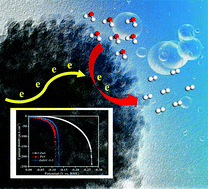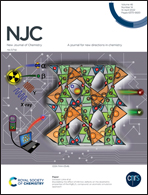Carbon-quantum-dot-modified ZnS nanospheres for highly efficient electrocatalytic hydrogen evolution†
Abstract
Electrocatalytic water splitting is an environmentally friendly method for producing hydrogen energy. To help realize the “hydrogen economy”, various electrocatalysts have been prepared. Here, we propose a microwave-assisted method to synthesize a CQD-modified ZnS electrocatalyst (ZnS/C) via a one-pot approach, where L-cysteine serves as the sulfur source and carbon source. The characterization results reveal that the loading of CQDs onto ZnS nanoparticles can dramatically increase the electron mobility and active area, playing a fundamental role in obtaining superior HER catalytic performance. Consequently, the as-prepared ZnS/C requires a low overpotential of only 126 mV to achieve a current density of 100 mA cm−2, and it has a low Tafel slope of 28.98 mV dec−1. Moreover, this study not only provides a high-efficiency and potential electrocatalyst for H2 evolution, but is also expected to provide a new design scheme for using CQDs as a cocatalyst to promote charge transfer in nanocomposites.



 Please wait while we load your content...
Please wait while we load your content...